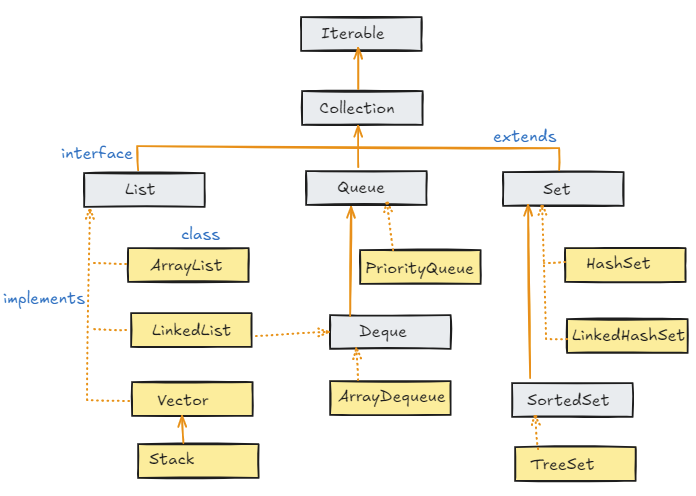Iterable and Iterator Interface

Iterable interface is used to represent a collection of elements that can be iterated over, while the Iterator interface provides a way to iterate over the elements of the collection.
-
Iterable<T>InterfaceImplementing a iterable interface means that now objects of this class can be iterated over using a loop.
Note - Iterable interface uses interator interface under the hood.
public interface Iterable<T> { Iterator<T> iterator(); } -
Iterator<T>Interfacepublic interface Iterator<T> { boolean hasNext(); // checks if elements are left T next(); // gives next element default void remove(); // optional }
Implementing Iterable
import java.util.Iterator;
public class CollectionTesting implements Iterable<Integer> {
private Integer arr[];
public CollectionTesting(Integer[] arr) {
this.arr = arr;
}
@Override
public Iterator<Integer> iterator() {
class ArrayIterator implements Iterator<Integer> {
private int indx = 0;
@Override
public boolean hasNext() {
return indx < arr.length;
}
@Override
public Integer next() {
return arr[indx++];
}
}
return new ArrayIterator();
}
public static void main(String[] args) {
Integer[] numbers = {1, 2, 3, 4, 5};
CollectionTesting collectionTesting = new CollectionTesting(numbers);
for (Integer number : collectionTesting){ // call iterator() which return ArrayIterator object
System.out.println(number);
// Andar ye hora hai while upr foreach loop me magic tha
Iterator<Integer> iterator = collectionTesting.iterator();
while (iterator.hasNext()) {
System.out.println(iterator.next());
}
}
}
}